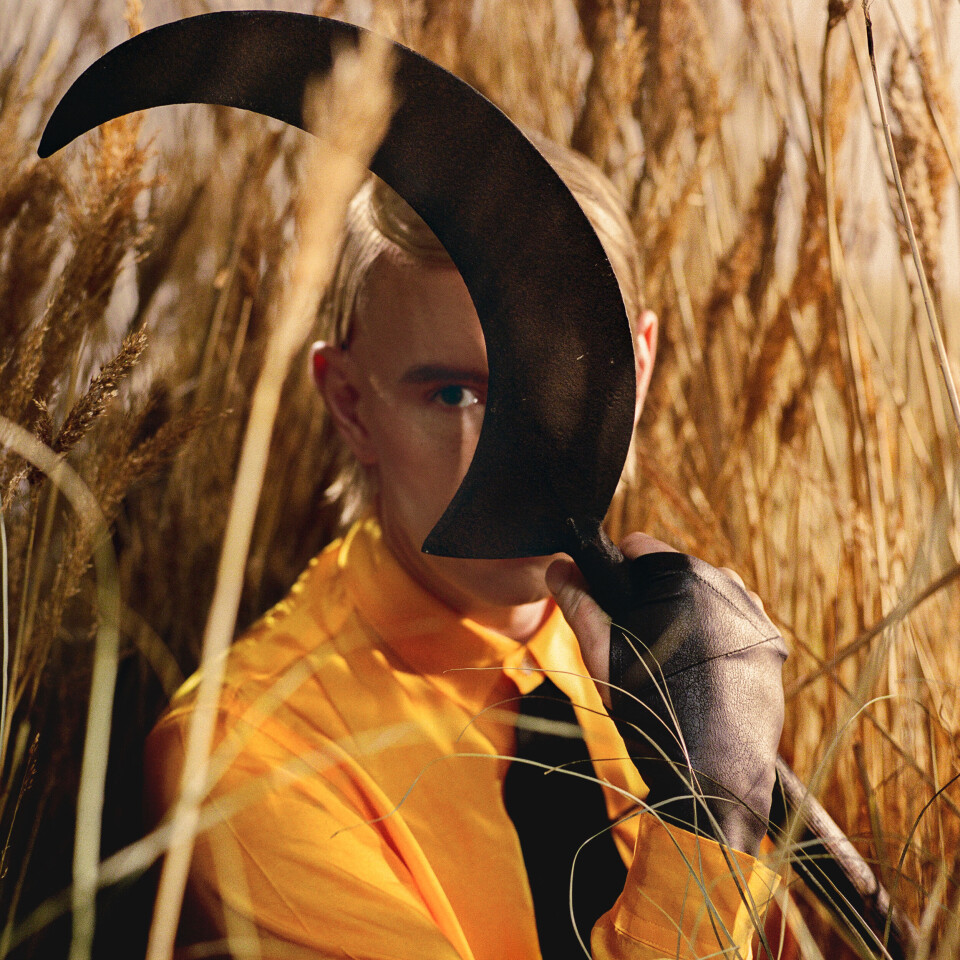
Patrick Wolf on grief, recovery and reclaiming his voice
“I show up now as an ambassador for my work”
In 2002 Patrick Wolf released his first EP, today sees the release of Crying The Neck, his first full album of new material since Lupercalia from 2011. We chatted with the singer/songwriter about his new album and the eventful years that came before it.
This is your first album with new material in a while. How does it feel to be back in the saddle?
“I've come back to work with a very different plan. I'm showing up as an ambassador for my writing and the music I make. So when a radio plugger takes a song to the radio, I'm not like, 'I want to be playlisted.' It's more like, 'I hope people hear this.' That's a big shift from when I was younger, when the work and the human being were so tightly conjoined — and not in a healthy way. Now I'm really unbothered in a good way. I have my life here, and whatever happens around the release, I can take or leave. I know what I need to do: the shows, the interviews. It all just feels like work now. It doesn’t affect me on an ego level anymore.”
The first single, 'Dies Irae,' was inspired by your mother’s passing. I can imagine performing that live might be difficult, even if the song celebrates her life. How do you think that will feel?
“I think it's fine to cry on stage, as long as I can still sing. My work has always held space for emotions people tend to bury or avoid. I'm used to diving into those uncomfortable spaces live. So I’m not too worried about performing it. What I am starting to feel is that the subject matter might be overwhelming for people who have experienced loss. And it is quite a monolithic subject for a return-to-work album. But I think it’s crucial that the album is also seen as an affirmation of life. It begins with personal decay and loss, yes, but the songs are responses to that: to death, to change in nature, in relationships, in yourself. It’s about transformation.”
And you anticipated this subject might one day arrive in your work?
“Absolutely. My father’s a jazz musician, my mother was a visual artist. I always knew that if I was going to process my life through albums, there would be one about my mother dying. I didn’t expect it so soon, but she left me so much to work with — artistically, spiritually. So the songs aren't just, 'this happened to me'. They’re transfigured through metaphor and fantasy, which I hope makes them transformative experiences for the listener.”
The first song on the album, 'Reculver,' is based on a demo you made at 16. What was it like to return to something that old?
“I’m 41 now, and honestly, I love being middle-aged. That song actually goes back even further, to when I was about 14. It was originally called 'Eustacia,' after Eustacia Vye from Thomas Hardy — a kind of wild, solitary woman living on the heath. I really related to her. That melody stayed with me as a kind of anthem for solitude, for doing everything alone, for self-responsibility. So when I revisited it, I realised the album needed to begin with that idea: taking responsibility for everything that’s happened. Not 'this happened to me,' but 'I survived this.' It's a re-entry song, really. 'This is where I've been. This is where I’m going. Are you coming with me?' ”
You’ve spoken openly about addiction, which affects a lot of people in the queer community. What was your experience with that?
“From about 23 to when I first got clean in 2016, I didn’t deal with it. There was a lot of secrecy, hedonism, fun, misery — but underneath it all, there was a malignancy eating away at my life and work. Everything became unmanageable. And that word really resonates in recovery: unmanageability. There was no dramatic rock bottom; it was more like a slow erasure over years. Eventually, I realised I was committing a slow suicide. Artistic death had already happened, but I was close to physical death too.
What saved me were recovery-based programs and the realisation that I needed to believe in my own worth. A lot of us in the queer community are taught to be self-sufficient, even stubborn. Asking for help feels unnatural. But recovery requires surrender. And it’s accessible. There are 12-step programs that welcome queer people. They’re spiritual, not religious. You stop taking the medicine — drugs or alcohol — and only then can you begin to diagnose and treat the disease.”
A documentary about your life is currently in the works. Will this subject be explored in it as well?
“Probably, yes. What's different about this film is that I'm not in control. I usually direct and compose and design everything myself, but this time I chose to become the subject. I’ve only asked to see the final edit. The filming overlapped with the end of my psychotherapy, so a lot of raw nerve endings got captured. I made myself completely open, and I think the documentary will reflect that.”
When will we get to see it?
“There are two projects. A short film that should be out this year, and then the full-length one probably next year. I can’t say much more yet.”
I noticed your new song 'Jupiter' has this breakbeat feel, very 90s, very unexpected from you. Where did that come from?
“Yeah, it was quite instinctual. Around the time everything was collapsing for me, I had to go to hospital to have a precancerous mole removed. I’d already dodged so many other near-death things by then. On the way there, I passed this man under a tree — black hat, walking stick, just whistling. The whole day felt silent except for him. So I recorded the whistle and built a loop around it. That became 'Jupiter'.
It made me think of listening to Beck in the summer of ’96. Later, when I was 90 days clean, I woke up and saw three planets aligned in the sky from my flat in London. Jupiter was the brightest that day. The song became about what survives decay, and for me, Jupiter became the planet of recovery.”
Crying The Neck is part of a four-album cycle. Is the plan fully mapped out?
“Yes, completely. I needed a structure after years of chaos. This album all fits within the months of July to September. My mum was born and died in August, so that season felt right. Then I realised: the songs I cut from this album would fit perfectly in October. That became the next album. I now have this whole 'wheel of the year' approach, like a pagan calendar. And it’s working. Without a label or A&R telling me what to do, I’m free to build each album as a little ecosystem. It’s how I used to work, and I’m sticking to it.”

You recently reissued your second album Wind in the Wires. How does Crying The Neck relate to that?
“I haven’t fully worked that out yet, but they feel connected. Wind in the Wires was full of yearning and movement: 'I've got to go.' Crying The Neck is more grounded. In a way, they're Songs of Innocence and Songs of Experience, twenty years apart. They’re the only two albums I’ve made that are so rooted in specific places. Wind in the Wires is all West Cornwall. Crying The Neck is East Kent. They feel like siblings.”
Will we ever get a coloured vinyl reissue of your third album The Magic Position, which was your first major-label effort?
“I wish. I own the rights to all my albums except The Magic Position and Lupercalia. They're stuck in the major label system. I don’t see any royalties from those recordings, only publishing. Lupercalia was even removed from streaming outside Europe and the UK without warning. In 2027, I might re-record The Magic Position.”
It could be The Magic Position (Taylor’s Version)!
“[laughs] Yes, I’ll get Taylor Swift to produce it! But seriously, maybe I’ll do an orchestral version. But right now, I need to focus on new work.”
What's your relationship with The Magic Position now?
“I think it's a brave record. People see the colour and gloss, but it’s a gothic album at heart. Tracks like 'Augustine' and 'Secret Garden' have real darkness. I used to feel shame about it because I hadn’t processed a lot of things yet. But when I look back, I see a 25-year-old trying to deliver something uncompromising in a high-pressure system. And I’m proud of that. It might not have aged perfectly, but the work holds up.”
You've come a long way as a queer artist — from not talking about it to singing lyrics like 'Who will penetrate the tightening muscle.' How do you see your role now, especially in a time where acceptance seems to be going backwards?
“I actually think the concept of a "queer artist" isn’t helpful. We worked hard in the 2000s to say: we are artists, period. Not gay artists or Black artists or women artists — just artists. And I think it’s limiting to brand yourself as a queer artist from your debut. There’s no such thing as "gay music." Be proud of who you are, of course. But don’t narrow your artistic voice. What if one day you want to write a novel about two nuns in the Nepalese mountains? That’s not a queer story, but it’s yours. Let your identity be a lens, not a label.”
So you're more private now?
“Definitely. I'm here to represent my work, not to sell you my life. We live in a cult-of-personality era. But privacy isn’t shame or secrecy — it’s strength. And a lot of people I love have no social media. That inspires me. It’s okay to set boundaries, even as artists. Maybe especially as artists.”
Crying The Neck is out now.


